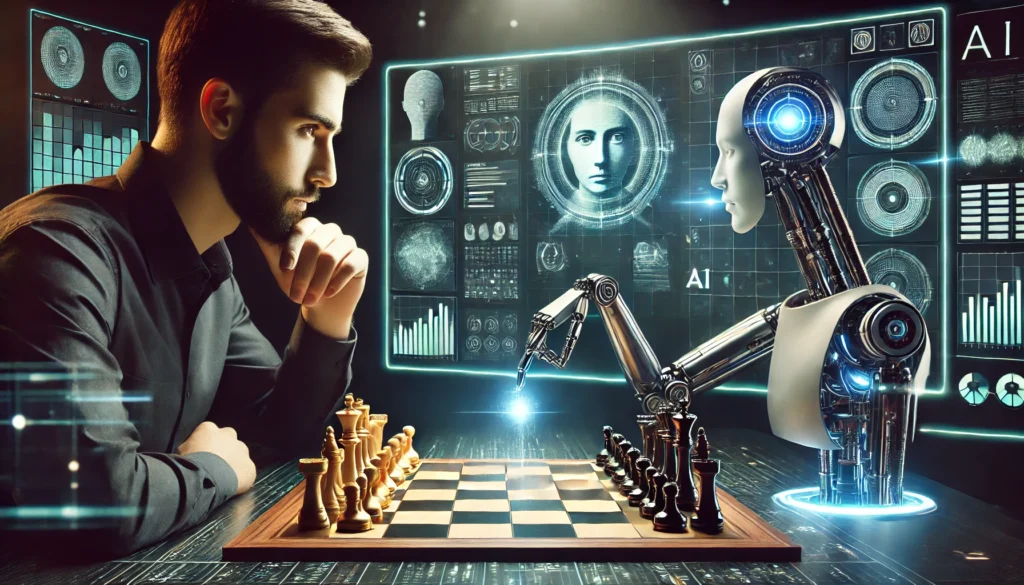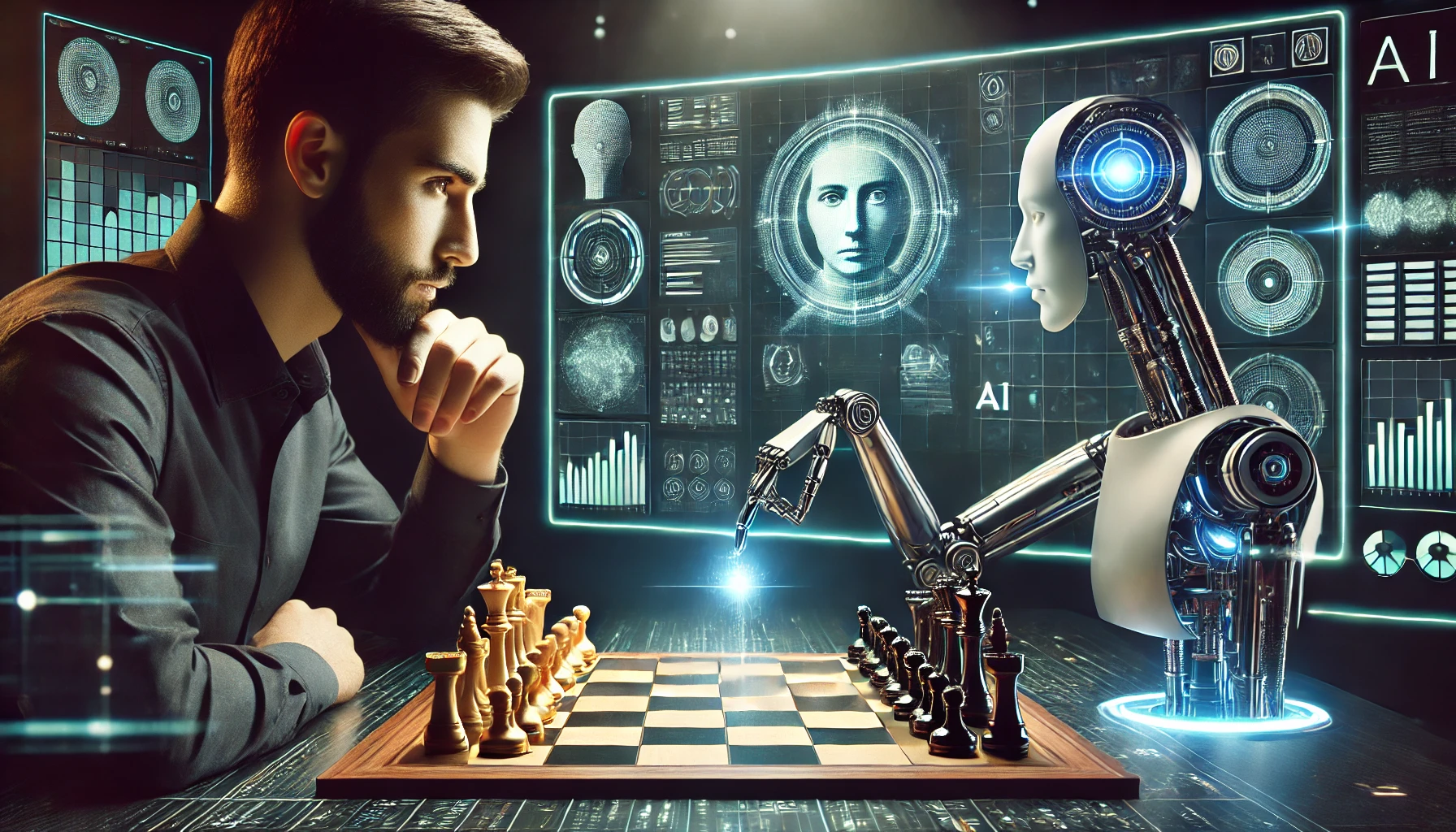Introduction
Chess has long been a game of strategy, patience, and deep thinking. With the advent of artificial intelligence (AI), players now have access to powerful chess engines that can analyze millions of positions per second. Playing chess against computer can be extremely difficult as this is human vs machine however not to forget that machines were also created by a human only.
Let’s understand the dynamics

History of Computers in Chess
The relationship between chess and computers dates back to the mid-20th century. Some key milestones include:
- 1950s: Alan Turing and Claude Shannon laid the groundwork for computer chess.
- 1997: IBM’s Deep Blue defeated Garry Kasparov, marking a historic moment in AI and chess.
- 2017: AlphaZero, developed by DeepMind, learned chess without prior human input and quickly surpassed all existing engines.
Today, engines like Stockfish, Leela Chess Zero, and Komodo dominate the digital chess landscape.
These achievements are the advocate that playing against a computer is not a piece of chess.
Human vs Machine: Key Arguments
Advantages of Playing Against a Computer
- Unmatched Calculation Ability
- Computers can analyze millions of positions per second, making them tactically superior to humans.
- They do not experience fatigue, emotional pressure, or distraction.
- Objective Decision-Making
- Chess engines rely purely on mathematical evaluation, eliminating bias and psychological factors.
- They can detect minute errors in human play instantly.
- Availability and Accessibility
- AI-driven chess programs are accessible 24/7, providing an excellent training resource.
- Engines offer varying difficulty levels, allowing players to train effectively at their own pace.
- Deep Analysis and Learning
- AI can analyze games in-depth, providing accurate feedback and blunder detection.
- Endgame tablebases allow for perfect play in critical positions.
Strengths of Human Chess Players
- Creativity and Intuition
- Unlike machines, humans can apply intuition, creative sacrifices, and long-term strategic planning.
- Grandmasters often make brilliant moves based on psychological intuition rather than brute-force calculation.
- Psychological Warfare
- Human players can use mind games, deception, and unpredictability to unsettle their opponents.
- Understanding an opponent’s mindset is a uniquely human trait that computers lack.
- Adaptability and Learning
- Humans can learn from past experiences and apply new ideas dynamically.
- AI relies on algorithms and databases but lacks the adaptability of a human brain.
- Imperfect Play Creates Excitement
- Human errors make chess unpredictable and thrilling to watch.
- Computers play perfect moves, reducing the excitement of unexpected blunders and turnarounds.
Popular Chess Engines and Platforms
1. Stockfish
- Open-source and extremely powerful.
- Used by most chess professionals for analysis.
- Customizable difficulty settings.
2. Leela Chess Zero (LCZero)
- AI-driven and based on deep learning.
- Mimics human-like thinking patterns.
- Excellent for strategic play improvement.
3. Komodo Chess
- Balances strength with human-like play.
- Adjustable settings for training purposes.
4. Online Platforms
Many online chess platforms integrate these engines for playing and analysis:
- Lichess (Free and open-source with Stockfish integration)
- Chess.com (Provides different AI bots with unique playing styles)
- FIDE Online Arena (Used by professionals for rated online games)
Strategies to Beat a Chess Computer
1. Avoid Predictable Play
Engines excel at calculating long forced sequences. Avoid repetitive moves and predictable patterns to maintain flexibility in your strategy.
2. Play Positional Chess
Instead of going for quick tactical skirmishes, focus on improving your position with long-term plans. AI often struggles with deep positional understanding in closed positions.
3. Use Human Intuition
Computers may evaluate a position as equal, but human players can take advantage of practical difficulties. Creating complex, unclear positions may force an AI to make errors at lower difficulty levels.
4. Endgame Knowledge is Key
Playing against AI in endgames can sharpen your skills in theoretical positions. Studying endgame tablebases will help you hold your own against an engine.
5. Adjust the AI Settings
Many engines allow for adjusting difficulty, playing styles, and even inducing blunders. Set the AI to a challenging but beatable level to enhance learning without frustration.
How to Use AI for Chess Training
1. Analyzing Games
After playing a game, use AI to review your moves, highlight blunders, and suggest improvements.
2. Practicing Specific Positions
Engines can be programmed to play specific openings or endgames, helping players sharpen their skills in targeted areas.
3. Simulating Grandmaster Play
Modern engines can mimic human-like play styles, allowing players to practice against simulations of top grandmasters.
Why Humans Are and Will Always Be Better Than computer
While computer may dominate chess in raw calculation and precision, humans possess unique qualities that machines will never replicate. Creativity, intuition, psychological warfare, and adaptability define the essence of human play. Chess is not just about making the best move; it is about storytelling, risk-taking, and emotional resilience. AI lacks the ability to think beyond programmed algorithms, while humans can innovate, improvise, and inspire.
Even in an era of unbeatable chess engines, the human element will always make chess exciting and unpredictable. The greatest moments in chess history are not just about brilliant moves but about the drama, rivalry, and resilience of human champions. Machines may play perfect chess, but it is humans who give the game its soul.



